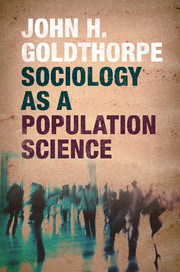Book contents
- Frontmatter
- Dedication
- Contents
- Acknowledgements
- Introduction
- 1 Sociology as a population science: the central idea
- 2 Individual variability in human social life
- 3 The individualistic paradigm
- 4 Population regularities as basic explananda
- 5 Statistics, concepts and the objects of sociological study
- 6 Statistics and methods of data collection
- 7 Statistics and methods of data analysis
- 8 The limits of statistics: causal explanation
- 9 Causal explanation through social mechanisms
- Conclusion
- References
- Index
6 - Statistics and methods of data collection
Published online by Cambridge University Press: 05 December 2015
- Frontmatter
- Dedication
- Contents
- Acknowledgements
- Introduction
- 1 Sociology as a population science: the central idea
- 2 Individual variability in human social life
- 3 The individualistic paradigm
- 4 Population regularities as basic explananda
- 5 Statistics, concepts and the objects of sociological study
- 6 Statistics and methods of data collection
- 7 Statistics and methods of data analysis
- 8 The limits of statistics: causal explanation
- 9 Causal explanation through social mechanisms
- Conclusion
- References
- Index
Summary
In sociology as a population science, the foundational role played by statistics in establishing population regularities stems, in the first place, from the need for methods of data collection that are able to accommodate the degree of variability characteristic of human social life, in particular at the individual level, and that can thus provide an adequate basis for the analysis of regularities occurring within the variation that exists.
Over many decades now, the role of statistics in sociology has tended steadily to increase. Yet this tendency would seem to have attracted rather more in the way of criticism – for example, as expressing an unacceptable ‘positivism’ – than of attempts at explanation: that is, explanation of why it should be that two statistically informed methodologies, sample survey research and multivariate data analysis, should in fact, despite all opposition, have become so central to sociology.
As regards data collection, which is the concern of the present chapter, the following observation may be taken as a starting point. The editors of a leading text on social survey research, Wright and Marsden (2010: 4), make the scarcely disputable claim that ‘the sample survey has emerged as the principal means of obtaining information on modern human populations’, but they then have little, if anything, to say about why this should be so. What can, however, be shown, and has in the present context to be emphasised, is that the sample survey did not achieve its present prominence in some more or less fortuitous way. It did so because it represented the eventual solution to two (closely related) problems that persisted in social research from the mid-nineteenth through to the mid-twentieth century.
The first of these problems was that the data on human populations obtained from the censuses and registration procedures that were developed in Western societies from the later eighteenth century onwards, while for many purposes invaluable, had, if only on grounds of cost, to be quite restricted in their scope. Other methods of data collection were therefore needed through which population coverage could be traded off against the possibility of obtaining information of a wider-ranging yet also more detailed kind. However, the second problem then arose.
- Type
- Chapter
- Information
- Sociology as a Population Science , pp. 70 - 84Publisher: Cambridge University PressPrint publication year: 2015



